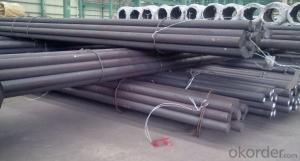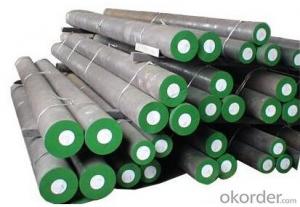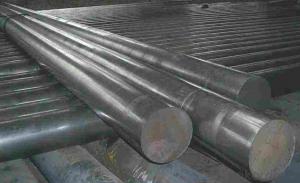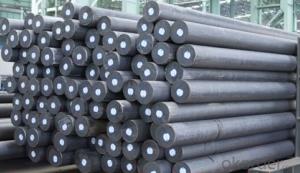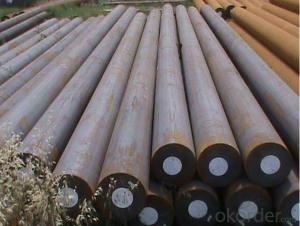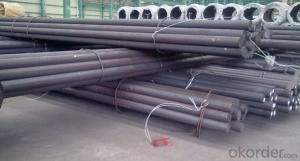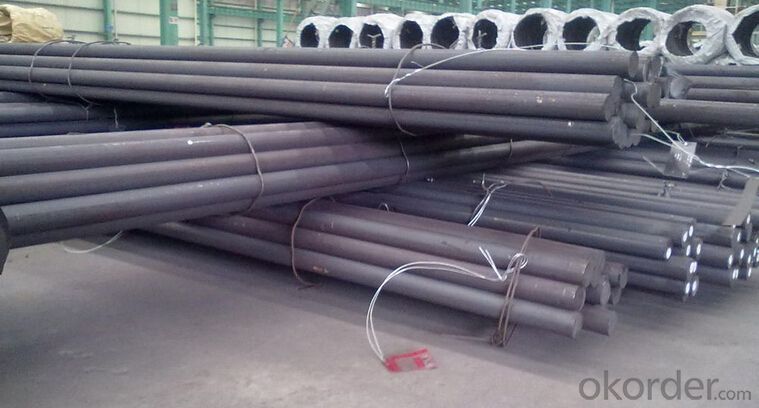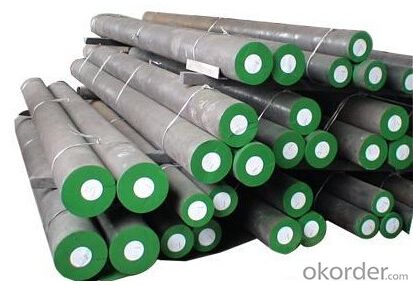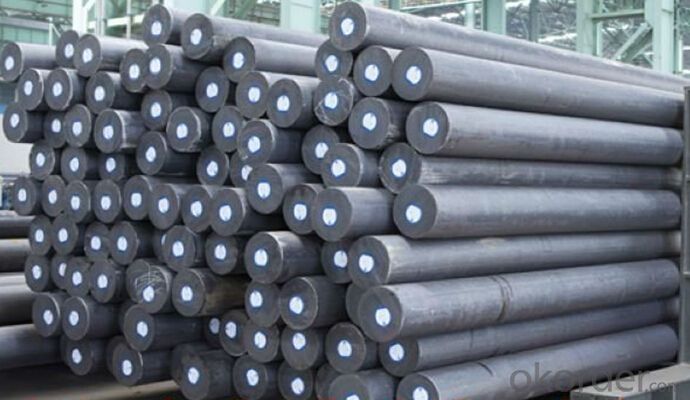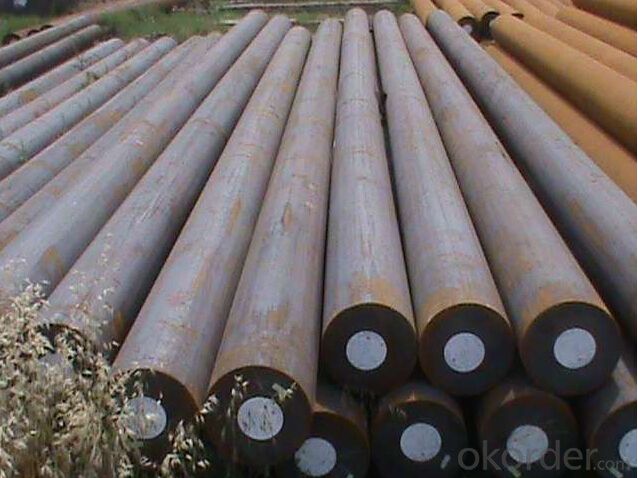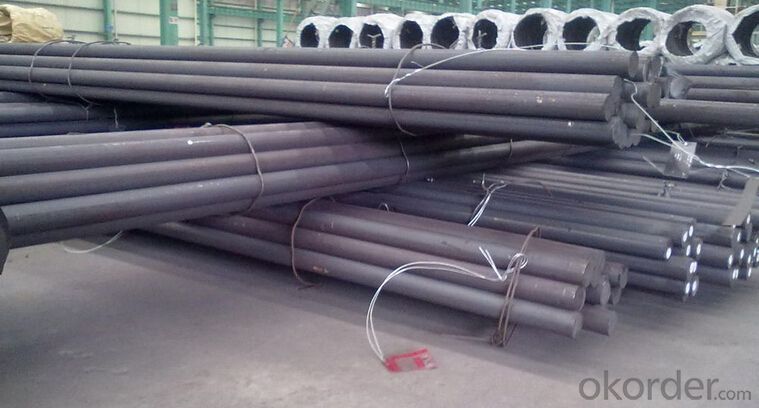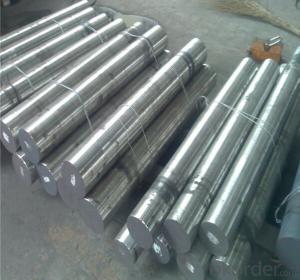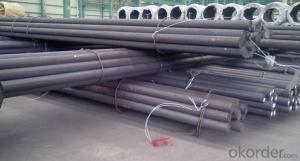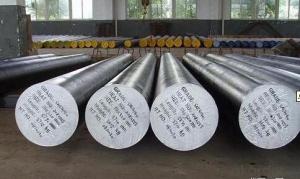Grade SAE1008 CNBM Alloy Steel Round Bar
- Loading Port:
- Shanghai
- Payment Terms:
- TT OR LC
- Min Order Qty:
- 3 m.t
- Supply Capability:
- 10000 m.t/month
OKorder Service Pledge
OKorder Financial Service
You Might Also Like
Specification
Specification of Round Bar
Diameter: 4mm - 800mm
Length: Max 12m
Heat Treatment: Normalizing, Annealing, Tempering, Quenching
Chemical Composition
C | Si | Mn | P | S | Cr | Ni | Cu |
0.47~0.55 | 0.17~0.37 | 0.50~0.80 | ≤0.035 | ≤0.035 | ≤0.15 | ≤0.25 | ≤0.25 |
Our Featured Products
Description | Alloy Steel / Carbon Steel / Spring Steel, Bearing Steel | |
Alloy Steel | ASTM | 1320, 1330, 1335, 1340, 1345, TS14B35, 50B46H, |
50B44, 5115, 5120, 5130, 5132, 5140, 5145, A-387Cr.B | ||
4119, 4125, 4130, 4140, 4135, 6120, 6140, 6150, 5152 | ||
3140H, 3316, 3325, 3330, 80B20, 4340, 50B40 | ||
DIN | 20Mn5, 30Mn5, 36Mn5, 46Mn7, 20MnV6, 37MnSi5 | |
46MnSi4, 15Cr3, 20Cr4, 28Cr4, 34Cr4, 41Cr4, 13CrMo44 | ||
16CrMo44, 20CrMo44, 25CrMo4, 42CrMo4, 34CrMo4 | ||
13CrMoV42, 22CrV4, 42CrV6, 50CrV4, 40NiCr6, 20NiCr14 | ||
28NiCr10, 41CrAlMo07, 40NiCrMo22, 34CrNiMo6 | ||
JIS | SMn420, SMn433H, SMn438H, SMn443, SCr415H, SCr420H | |
SCr430(H), SCr440, SCr445, STC42, STT42, STB42, SCM420 | ||
SCM440, SCM435, SUP10, SUP9, SNC236, SNC631, SAC645 | ||
Carbon Steel | ASTM | 1005,1006,1008,1010,1015,1020,1025,1030,1035, 1040 |
1045, 1050, 1055, 1060, 1065, 1070, 1080, 1084, | ||
DIN | C10, C15, C22, C35, C45, C60, Ck25, Ck35, Ck40,Ck45, Ck50 | |
Ck53, 14Mn4, 30Mn4, 40Mn4 | ||
JIS | S09CK, S9CK, S10C, S15C - S53C | |
Spring Steel | ASTM | 1060, C1085, 1084, 1566, 9255, 9260, 9260H, 6150 |
DIN | C60, 55Si7, 65Si7, 50CrV4, 60SiCr7 | |
JIS | S58C, SUP3, SUP6, SUP7, SUP10 | |
Bearing Steel | ASTM | sae 52100 |
DIN | 100Cr6 | |
JIS | suj 2 | |
Standard | GB/T799,ASTM A29,A108,A321,A575,BS970,DIN1652,JIS G4051 | |
Section shape | Round Bar, Square Bar, Wire Rod, Flat Bar, Angle Bar, Tube /Pipe | |
Surface | Black, Polished, Coated, Galvanized | |
Specifications | Round bar | Diameter: 4mm - 800mm |
Angle bar | Size: 3mm*20mm*20mm - 12mm*800mm*800mm | |
Square bar | Size: 4mm*4mm - 100mm*100mm | |
Flat bar | Thickness: 2mm- 100mm | |
Width:10mm - 500mm | ||
Hexagonal | Size: 4mm - 800mm | |
Length | 2m, 4m, 5.8m, 6m, 11.8m, 12m or as required. | |
Trade terms | Payment terms | 30% T/T Deposit, 70%T/T before Delivery |
L/C at Sight | ||
Price terms | FOB,CIF,CFR,EXW | |
Package | Bundled, wooden box for export standard package. | |
Export to | Ireland,Singapore,Indonesia,Ukraine,Saudi Arabia,Spain, | |
USA,Brazil,Thailand,Korea,Italy,India,Egypt,Oman,Malaysia, | ||
Kuwait,Canada, Viet Nam, Peru,Mexico,Dubai, Russia,etc | ||
Delivery Time | About 30-40 days | |
According to QTY | ||
Usage and Applications of Round Bar
1. Chinese standard steel bar is often used where large amounts of steel need to be formed, for example as structural steel.
2. And we can use this kind of product on the performance of the mechanical parts if the demand is not very high.
3. Steel round bar is used in construction and a large number of architectural and engineering structures.
Packaging & Delivery of Round Bar
Packaging Detail: All goods are packed in bundle with steel strips and shipped by break bulk vessel or container (depend on target market and different ports)
Delivery Detail: 15~45 days
Trade terms: FOB, CFR, CIF
Weight: Theprice invoicing on theoretical weight basis or actual weight basis depends on customer’s request.
Shipment: The shipment of bulk break or container is depends on customer’s request and the situation of the port of destination.
Documents given: Full set of original clean on board bill of lading; Original signed commercial invoice; Original packing list; Policy of insurance; Certificate of origin and what the target market needs.
FAQ:
Q1: Why buy Materials & Equipment from OKorder.com?
A1: All products offered byOKorder.com are carefully selected from China's most reliable manufacturing enterprises. Through its ISO certifications, OKorder.com adheres to the highest standards and a commitment to supply chain safety and customer satisfaction.
Q2: How do we guarantee the quality of our products?
A2: We have established an advanced quality management system which conducts strict quality tests at every step, from raw materials to the final product. At the same time, we provide extensive follow-up service assurances as required.
Q3: How soon can we receive the product after purchase?
A3: Within three days of placing an order, we will begin production. The specific shipping date is dependent upon international and government factors, but is typically 7 to 10 workdays.
Q4: What makes stainless steel stainless?
A4: Stainless steel must contain at least 10.5 % chromium. It is this element that reacts with the oxygen in the air to form a complex chrome-oxide surface layer that is invisible but strong enough to prevent further oxygen from "staining" (rusting) the surface. Higher levels of chromium and the addition of other alloying elements such as nickel and molybdenum enhance this surface layer and improve the corrosion resistance of the stainless material.
Q5: Can stainless steel rust?
A5: Stainless does not "rust" as you think of regular steel rusting with a red oxide on the surface that flakes off. If you see red rust it is probably due to some iron particles that have contaminated the surface of the stainless steel and it is these iron particles that are rusting. Look at the source of the rusting and see if you can remove it from the surface.
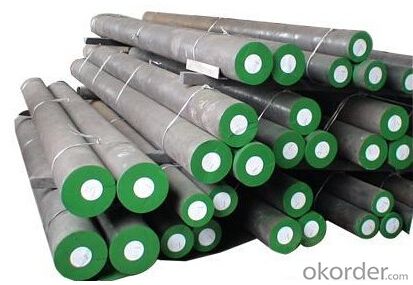
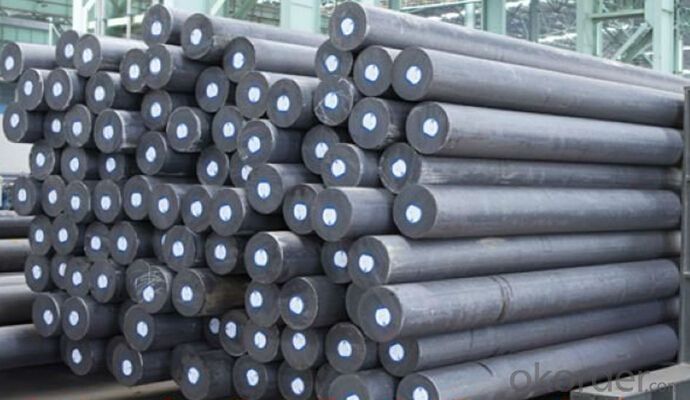
- Q: Can special steel be used for making aerospace engine components?
- Certainly, aerospace engine components can be made using special steel. The aerospace industry commonly utilizes special steel alloys, such as nickel-based superalloys and stainless steels, due to their remarkable mechanical properties, ability to withstand high temperatures, and superior resistance to corrosion. These alloys are specifically engineered to endure the extreme conditions and demands of aerospace engines, including high temperatures, pressures, and stress levels. Moreover, special steel alloys offer a high strength-to-weight ratio, which is crucial in reducing the weight of aerospace components while preserving their structural integrity. Consequently, the utilization of special steel in aerospace engine components ensures the dependability, performance, and safety of engines in aeronautical applications.
- Q: Is special steel magnetic?
- Certainly, special steel possesses the ability to exhibit magnetism. The magnetism displayed by steel relies upon its composition and the inclusion of specific elements, like iron, nickel, and cobalt. Special steels that incorporate these magnetic elements are capable of showcasing magnetic properties. Nonetheless, it is important to note that not all forms of steel possess magnetism. For instance, certain stainless steels possess elevated levels of non-magnetic elements, such as chromium, which diminish their magnetic properties. Consequently, whether a particular kind of special steel possesses magnetism or not hinges upon its composition.
- Q: How is special steel used in the aerospace manufacturing process?
- Special steel is used in the aerospace manufacturing process primarily for its strength, durability, and resistance to extreme temperature and pressure conditions. It is commonly employed in the construction of critical components such as turbine blades, landing gear, and structural parts of aircraft. The unique properties of special steel enable it to withstand the demanding environments and ensure the safety and reliability of aerospace systems.
- Q: Is special steel suitable for manufacturing surgical instruments?
- Indeed, surgical instruments can be manufactured using special steel. Known as stainless steel, this type of steel is commonly utilized in the production of surgical instruments owing to its distinct characteristics. Its ability to resist corrosion is crucial in a surgical environment where instruments frequently encounter bodily fluids. Furthermore, special steel is resilient and can endure repeated sterilization procedures without compromising its functionality or structural integrity. Additionally, its non-magnetic properties make it appropriate for applications in MRI and other medical imaging procedures. In summary, special steel possesses the essential attributes necessary for the production of surgical instruments, guaranteeing their dependability, durability, and safety for both medical professionals and patients.
- Q: How is ultra-high-strength alloy steel used in the aerospace industry?
- Ultra-high-strength alloy steel is extensively used in the aerospace industry due to its exceptional strength-to-weight ratio. It is commonly employed in the manufacturing of aircraft components such as landing gear, engine mounts, and structural parts. This steel's remarkable strength helps enhance the overall structural integrity of aircraft, ensuring they can withstand extreme conditions and stresses encountered during flight. Additionally, its lightweight nature contributes to reducing the weight of the aircraft, which in turn improves fuel efficiency and increases payload capacity.
- Q: How is electrical steel used in the production of transformers and motors?
- Electrical steel is commonly used in the production of transformers and motors due to its unique magnetic properties. It is used to construct the cores of transformers and the stators and rotors of motors. The high magnetic permeability and low electrical resistance of electrical steel help in efficiently transferring and converting electrical energy. Additionally, its low core losses and hysteresis make it ideal for reducing energy wastage and enhancing the overall performance of these electrical devices.
- Q: How does special steel perform in dynamic loading conditions?
- Special steel performs exceptionally well in dynamic loading conditions. It has high strength, toughness, and fatigue resistance, making it capable of withstanding repeated loading and impacts without failure. Its ability to absorb and distribute stress evenly helps prevent cracks and fractures, ensuring the structural integrity of components even under demanding, dynamic loading conditions.
- Q: How is duplex stainless steel used in the oil and gas industry?
- Duplex stainless steel is widely used in the oil and gas industry due to its exceptional corrosion resistance, high strength, and good weldability. It is commonly used in various applications including offshore platforms, subsea pipelines, oil and gas refineries, and chemical processing plants. The duplex stainless steel's ability to withstand harsh environments, resist corrosion from corrosive fluids, and perform under high pressure and temperature conditions makes it a preferred material for critical components and equipment in the oil and gas sector.
- Q: What are the common alloys used in special steel?
- Some common alloys used in special steel include stainless steel (which contains chromium and nickel), tool steel (which contains tungsten, molybdenum, and vanadium), and high-speed steel (which contains tungsten, molybdenum, and cobalt).
- Q: What are the main factors that determine the cost of special steel?
- The cost of special steel is primarily influenced by various key factors. Firstly, the composition of the steel plays a crucial role in determining its cost. Special steels often contain specific alloying elements that enhance their properties, such as corrosion resistance, strength, or heat resistance. The cost of these alloying elements can vary considerably, and the higher the quantity and complexity of the alloy, the greater the cost of the steel. Secondly, the manufacturing process employed to produce the special steel can significantly impact its cost. Special steels typically require more intricate and controlled manufacturing processes compared to regular steel. These processes may involve additional steps like precise heat treatment, forging, or casting, which can raise the overall cost of the steel. Another essential factor that affects the cost of special steel is the market demand and availability. If a particular type of special steel is in high demand but limited supply, its cost tends to increase. Conversely, if there is an excess of a specific type of special steel, its cost may decrease. Market forces, including global supply and demand dynamics, can have a substantial impact on the cost of special steel. Furthermore, the quality and certification of the special steel can also influence its cost. Higher-quality steel that meets stringent industry standards and certifications often commands a higher price due to the additional testing, quality control, and documentation required. Transportation and logistics costs are also significant factors to consider. If the steel needs to be transported over long distances or requires specialized handling, it can contribute to the overall cost. Lastly, economic factors like currency exchange rates, inflation, and government policies can impact the cost of special steel. Fluctuations in exchange rates can affect the cost of raw materials and manufacturing equipment, which, in turn, influence the final price of the steel. Government policies, such as import and export tariffs or subsidies, can also have an impact on the cost of special steel. In conclusion, the cost of special steel is determined by various factors, including composition, manufacturing process, market demand and availability, quality and certification, transportation and logistics, and economic factors. Understanding these factors is crucial for both buyers and sellers of special steel in order to make informed decisions and ensure competitive pricing.
Send your message to us
Grade SAE1008 CNBM Alloy Steel Round Bar
- Loading Port:
- Shanghai
- Payment Terms:
- TT OR LC
- Min Order Qty:
- 3 m.t
- Supply Capability:
- 10000 m.t/month
OKorder Service Pledge
OKorder Financial Service
Similar products
Hot products
Hot Searches
Related keywords
